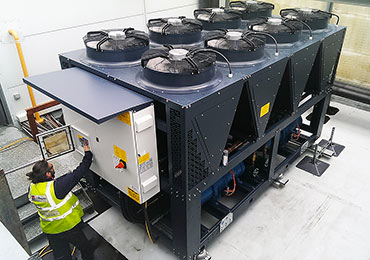Cool-Therm prescribes propane chillers
23rd March 2016 UK: A pharmaceutical company’s policy to move away from HFC refrigerants has prompted the installation of two propane chillers totalling 1MW.
UK: A pharmaceutical company’s policy to move away from HFC refrigerants has prompted the installation of two propane chillers totalling 1MW.
The two 500kW Geoclima screw chillers replace a conventional cooling system based on R407C refrigerant, which had also become unreliable before reaching the end of its anticipated operational life.
“In addition to its low GWP characteristics, the design was chosen for its excellent energy efficiency and ability to meet the electrical load limitations of the site, which were an issue and a potential restriction on the higher cooling capacity required of the replacement system,” commented Cool-Therm director Rob Young.
The plant is optimised to cool the building’s two wings using one chiller, with the second chiller coming on-stream automatically when load and ambient temperature increase, ensuring peak demand is met. When conditions allow, and the load reduces, the system automatically reverts to default one-chiller mode.
The propane chillers were craned into position in a two-stage process, one from a public road at an extended radius which used a specialist mobile tower crane. “Given the time of year, we had some concerns about high winds given the succession of storms during the lead up period. However, on the day there was 90 minute period of calm, enabling us to safely complete the lift,” Rob Young said.
The chillers are designed to operate on a low charge of propane given their size, and are equipped with high performance brazed plate heat exchangers, which boost efficiency further. They are also fitted with automatic water isolation valves to prevent water mixing across the system.
Following the success of this installation, Cool-Therm is now working on a second project on the site to replace an existing data centre cooling system which runs on HFCs. Because of the difficulty of using long pipe-runs for propane, the company is designing a mini propane-based chilled water CRAC system, to replace the existing HFC plant.







